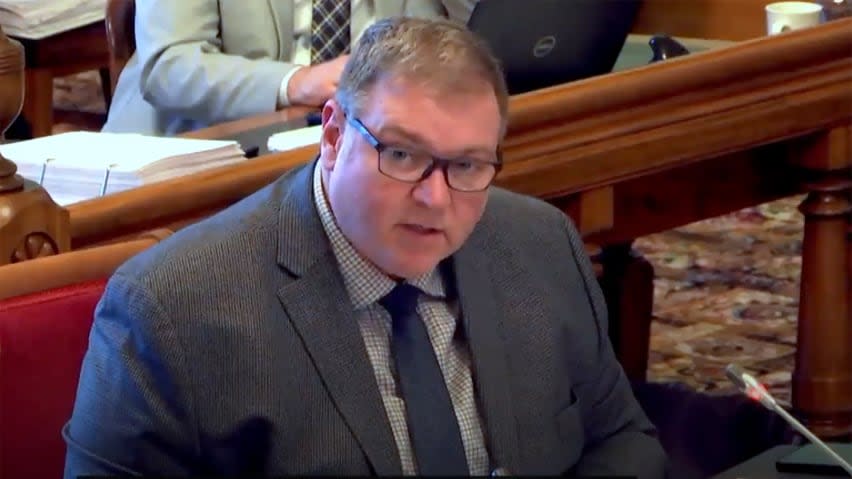Medical society has not seen N.B.'s primary health-care transformation strategy, says president

The New Brunswick Medical Society has not seen the province's primary health-care transformation strategy or the 18-month action plan, quietly launched about six months ago, according to the president.
"The NBMS is not aware of any comprehensive provincial strategy related to primary health care," said Dr. Paula Keating.
The professional association, which represents more than 2,000 practising, future, and retired physicians in the province, was not involved in developing the strategy either — "beyond typical budget submissions and discussions directly related to the negotiation of recent improvements to the Family Medicine New Brunswick program," she said.
The strategy and action plan, which the Department of Health has committed at least $10.3 million annually toward implementing, have not been made public.
Keating suggested a white paper the Department of Health hired a consultant to prepare has also been kept confidential.

The medical society was 'not engaged beyond typical budget submissions,' said president Dr. Paula Keating. (CBC)
Department spokesperson Sean Hatchard declined a request by CBC News to release the strategy and action plan. The department is still reviewing a request from the legislature's standing committee on public accounts last month, he said.
Green Party health critic Megan Mitton, who only learned of the strategy and action plan through mention in an annual report submitted to the committee, asked deputy minister Eric Beaulieu during a Feb. 21 appearance whether they could be released.
"I believe we can, but I want to check a few things first," Beaulieu said at the time, without elaborating.
'High level' overview of strategy
The deputy minister did, however, provide committee members with a "high level" overview. He said the strategy includes having interdisciplinary primary care teams consisting of doctors, nurses, and other allied health professionals, working either within the same setting or having formalized agreements with each other to care for patients.
The strategy also includes working with the regional health authorities to "renew" community health centres and health service centres across the province, making them more efficient, and enhancing electronic medical records — "making sure that we have a well-connected system so that if a Patient C is part of a clinic, that electronical medical record can be reviewed by any of the professionals that are providing care," Beaulieu said.

Deputy Health Minister Eric Beaulieu fielded questions about the strategy and action plan from opposition health critics who only learned of their existence through an annual report submitted to the legislature's standing committee on public accounts. (Legislative Assembly of New Brunswick)
It's unclear whether the strategy includes any specific targets.
The $10.3 million budgeted by the department for initiatives contained within the action plan does not include additional funding already budgeted by the regional health authorities, Hatchard said. He did not provide any other details.
Society had no formal role, says president
According to Keating, the medical society is aware that the department and the Executive Council Office held a series of meetings with the regional health authorities and "select stakeholders" early in 2023, following a call for ideas related to the 2023-24 provincial budget."
The government's hired consultant subsequently drafted a white paper, and government representatives presented the society's board of directors with "initiatives that were under consideration at the time," Keating said in an emailed statement.
But "the NBMS did not have a formal role in this process other than those engagements, and to our knowledge a final version of the white paper was not officially approved, shared or published," she said.
Voice of physicians 'well represented,' says department
Hatchard said work on the primary health-care transformation strategy and action plan was led by Department of Health staff and "health system partners as part of their regular duties."
A medical consultant was hired to provide "subject matter expertise," he said, declining to say how much they were paid or whether it went to tender. "Details of that contract cannot be shared."
The Department of Health, Horizon and Vitalité health networks, New Brunswick College of Family Physicians, New Brunswick Health Council, Department of Social Development, Extramural-Ambulance New Brunswick, and the Canadian College of Family Physicians were represented on the working group that developed the action plan, said Hatchard.
"The voice of New Brunswick physicians was well represented by the president of the [New Brunswick College of Family Physicians]," he said in an emailed statement.
The governance structure of the action plan and associated workgroups was shared with the New Brunswick Medical Society in June 2023 and it has been "an active participant in several committees tasked with actioning parts of the plan," according to Hatchard.
The New Brunswick Medical Society will "lead and operationalize initiatives in the action plan," along with the regional health authorities, he said.
"Investment has been made under the action plan in Family Medicine New Brunswick in order to attract and retain more physicians to a team-based model.
"The RHAs have responsibility over a network of community health centres, health service centres and communities which they plan to modernize by updating with a common electronic medical record system and reorganizing the workforce to support team-based collaborative care."
Six months into action plan
The department is already "about six months in" to the 18-month action plan, Beaulieu told the public accounts committee, in response to questions from Liberal health critic Rob McKee.
"When it was originally developed, it was very much a work plan … for the different partners in the system — primarily the department, the two RHAs and EM-ANB, moving it forward," said Beaulieu.
Some of the initiatives have been announced, he said, "but not necessarily the entire plan."
He cited as examples the ongoing funding of Family Medicine New Brunswick, investments into electronic medical records, and primary care initiatives by the regional health authorities.
The medical society is working with the department, the regional health authorities and other stakeholders to "better understand and guide" existing strategies to support primary care transformation, Keating said.
It has also been in discussions with physicians from across the province about how to accelerate the transition to team-based care, she said.


